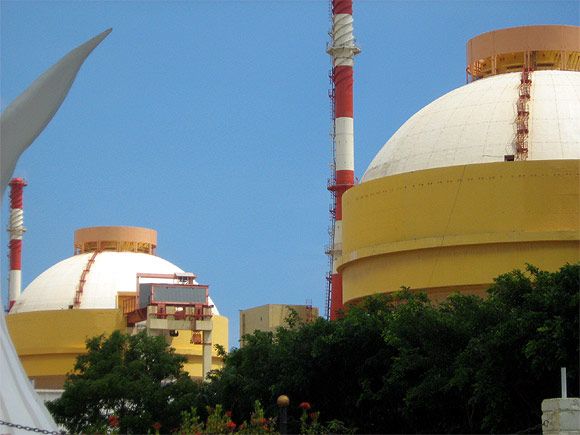 The much-delayed Kudankulam nuclear power project is expected to be commissioned by April, government told the Lok Sabha on Wednesday.
The much-delayed Kudankulam nuclear power project is expected to be commissioned by April, government told the Lok Sabha on Wednesday.
"All efforts are being made to commission units 1and 2 of Kudankulam Nuclear Power Project by April 2013 and October 2013 respectively," Minister of State in the Prime Minister's Office V Narayanasamy said in a written reply.
Of the 2,000 MW electricity to be generated by the two units, Tamil Nadu has been allocated 925 MW, Kerala (266 MW), Karnataka (442 MW) and Pondicherry (67 MW), he said.
"The government has also agreed to consider providing additional 100 MW power to Tamil Nadu," Narayanasamy said. Some power generated by the two units has not been allocated. In reply to a separate question, Narayanasamy said the Atomic Energy Regulatory Board had given clearance for the second heat up and full system tests of the unit-1 of Kudankulam nuclear power project on January 24.
Engineers of the Nuclear Power Corporation of India Limited were carrying out a series of integration tests in the presence of AERB team, which has been camping at the project site for the past one-and-a-half month.
On the safety of nuclear plants, Narayanasamy said atomic power stations in the coastal areas were designed taking into account technical parameters related to earthquake, tsunami, storm surges, wave run-up, floods and tides.
Narayanasamy said the shore protection measures include construction of civil structures like break waters, bunds, walls etc to minimise the effect of these natural events.
“Safety is a moving target in nuclear power plants and is continuously evolving based on the reviews by utilities and AERB besides internationally evolving standards," he said.
He said a framework to periodically review safety issues in context of national as well as global nuclear industry events and incorporate necessary measures to strengthen the safety, as required, was in place.
In December, the AERB had given its nod for the 'second heat up', under which all systems of the entire nuclear power plant will be put to test to demonstrate its operability and safety.
It was during these tests that engineers found certain deviations in some plant equipment and it was felt that some maintenance operations needed to be carried out. The permission for repeating the second heat-up and to carry out the hydro-test was granted by AERB on January 24. A specially-designed robotic arm had begun loading 163 bundles of enriched uranium fuel on September 18 and the process was completed on October 2.
The project was the outcome of an inter-governmental agreement between India and Russia in 1988 and construction of the plant began in 1997.
But the project ran into rough weather after anti-nuclear activists stalled progress last year when the first unit was nearing commissioning.










